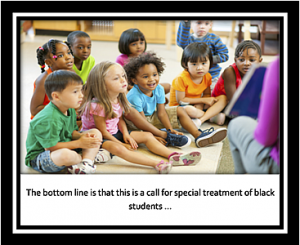Black Privilege is Real in America
I have read, and my wife has told me a thousand times, “Do not read a newspaper or watch a TV newscast shortly before going to bed.” The warning is that doing so will interfere with my sleep.

I certainly wish that I had followed that sound advice on 6 December 2019. Instead, I made the mistake of reading the Fayetteville Observer online edition for that day. It included an opinion piece by Debra Figgins, who is president of the Fayetteville Alumnae Chapter of Delta Sigma Theta Sorority, Inc. The title was “County schools must address racial disparities in discipline”. I do not doubt that Ms. Figgins, and those she represents, firmly believes all that was presented in that opinion piece. What I say here intends no disrespect or lack of appreciation for Ms. Figgins or her sorority. However, her presentation disrupted my sleep because it was more of the arguments for actions that I believe fail to appropriately address the matter at hand. That is, inordinately high rates of serious disciplinary actions toward black students in public schools.
Beyond not forthrightly determining and addressing the root causes of unacceptable conduct by black students, I see placing full blame and corrective responsibility on educators and other staff as unfair and doomed to failure. My observation is that this is, by no means, where the bulk of the blame and responsibility for correction should fall. Be assured, this thinking did not just show up for me as a result of this opinion piece. Reading it was simply like gasoline on a smoldering fire.
Being black and proud of it makes it very difficult to be silent when I see what feels like excuse-making and passing-the-buck when it comes to dealing with the unacceptable conditions and actions of some black Americans. My level of sadness and outrage generated by this excuse-making and buck-passing is heightened by various observations and experiences. Among the observations and experiences that send my sadness and outrage meter spiraling is the attention given to charges of “white privilege”. White people today are supposed to feel guilty because of whatever advantage they supposedly have in life because of being white. Further, they are required to, somehow, compensate black Americans for some immeasurable disadvantage our ancestors suffered.
The contention is that black Americans are still adversely impacted by slavery and all of the horrendous events that followed. I accept that position. I part ways with those who, under the “white privilege” umbrella, are comfortable seeking to solve problems plaguing black Americans by totally blaming white Americans and calling on them to fix our situation, while we accept no responsibility for causing or fixing our problems. All of this in a climate where, while not perfect, opportunities for black Americans to succeed in life are substantial.
For me, thinking such as that put forth by Debra Figgins aligns with the excuse-making, pass-the-buck approach justified by claims of white privilege. As I reflected on the opinion piece and how what is proposed there is actually happening across the country, my thought was: “White privilege is alleged, but black privilege is real.” I could not sleep.
Figgins opens by explaining: “The Social Action Committee of the Fayetteville Alumnae Chapter (FAC) wrote a resolution entitled, ‘Resolution to Eliminate Racial Disparities in School Suspensions and Stop the School to Prison Pipeline’ to address an issue that not only plagues Cumberland County Schools, but the state and nation as well.” She then presents statistics regarding this issue:
Unfortunately, this October Cumberland County Schools and North Carolina Department of Public Instruction reported in 2017-2018, black girls were suspended at 7 times the rate of white girls. Black boys were suspended at 5 times the rate of white boys. Black students were suspended at 5.5 times the rate of white students. Seventy percent of short-term suspensions in Cumberland County Schools were black students.
Eighty-two percent of long-term suspensions were black students. It is time to identify more effective strategies to eliminate placing students of color on a path to prison.
The resolution closes as follows:
Resolved, that the Fayetteville Alumnae Chapter of Delta Sigma Theta Sorority, Incorporated, on behalf of its members: 1. urges the Cumberland County Board of Education to develop policies that will significantly reduce racial disparities in suspensions; 2. requests that all Cumberland County School employees and Board of Education members be required to participate in cultural sensitivity to enhance their ability to work with racially and ethnically diverse populations; 3. requests that the leadership of Cumberland County Schools annually evaluate each school’s disciplinary policies using a racially equitable lens to determine if those polices disparately impact students of racial minorities; 4. advocates for greater diversity in the hiring of teachers and administrators within the Cumberland County School District; 5. recognizes that implementing systemic change to affect positive outcomes for students of color requires involvement by community stakeholders; 6. commits fully to bring about this needed change by supporting Cumberland County Schools through engagement with school officials, serving on system-wide committees, acting as mentors to students and supporting teachers, parents and student resource providers; and 7. believes that together we can significantly impact the quality of education for all students in Cumberland County Schools.
As I read this opinion piece, my impression was that the school system, especially teachers and school staff, are being called on to do the fixing of this problem. I see nothing that puts responsibility on anybody else. Maybe this resolution addresses school personnel and there is another one that speaks to students and their responsibilities/conduct. Maybe the same is the case with parents. If an equal level of scrutiny and pressure is being applied to Cumberland County students and parents, please show me.
If I have accurately assessed what is being called for here, it means special treatment of disruptive black students, while disadvantaging educators and non-disruptive students. For educators, that disadvantaging comes by way of adding a multitude of new requirements to a workload that is very likely already overwhelming for most. Further, the additional requirements, without attention to parental and student responsibilities are doomed to failure. Sadly, students who, without regard to race, will be disadvantaged in that teachers will have even less time and energy for helping them in their education process.
The bottom line is that this is a call for special treatment of black students, while disadvantaging educators and other students; even those black students who want to learn and do not present disciplinary problems. This is “black privilege”.
What is being proposed by Debra Figgins and her sorority is not new. Not only have the kinds of proposals put forth here been considered elsewhere; many have been implemented. This from a 2014 article by Kimberly Hefling titled, “Government issuing recommendations for classroom discipline”:
The Obama administration on Wednesday pressed the nation’s schools to abandon what it described as overly zealous discipline policies that send students to court instead of the principal’s office. Even before the announcement, school districts around the country have been taking action to adjust the policies that disproportionately affect minority students.
The following statement from a 19 December 2018 article by Jonathan Butcher titled, “Obama’s School Discipline Guidance Could Be Doomed. Here’s Why That’s Great News” gives a critical clarification the Obama guidance:
And a letter drafted by the Wisconsin Institute for Law and Liberty and signed by state-based research institutes questioned the Dear Colleague letter’s use of “disparate impact.” The federal guidance used this legal theory to threaten schools with investigations if schools disciplined students from certain races more often—even if the same students broke rules more frequently than their peers.
Key on “…-even if the same students broke rules more frequently than their peers.” I contend this piece of information is further support for the label of “black privilege”. This is special treatment of one group, while disadvantaging others. Based on the Obama guidance, schools across this nation implemented the kinds of actions called for by Figgins.
Now comes the test of all that I have argued to this point. An article on 21 December 2018, by Francisco Vara-Orta, titled, “It’s official: DeVos has axed Obama discipline guidelines meant to reduce suspensions of students of color” begins with this opening paragraph: “It’s official: Education Secretary Betsy DeVos has rescinded the guidance issued by the Obama administration directing schools to reduce racial disparities in how they discipline students.” Although the guidelines have been rescinded, school systems are given the authority to determine disciplinary policies at the local level.
Despite rescinding of the Obama guidelines, my expectation is that local school systems will still be pressured to take the kinds of actions called for by those guidelines. That is exactly what is happening in the resolution effort underway by Debra Figgins and the Fayetteville Alumnae Chapter of Delta Sigma Theta Sorority, Inc. Far more often than not, school systems will yield to these demands. Black privilege is real in America.




